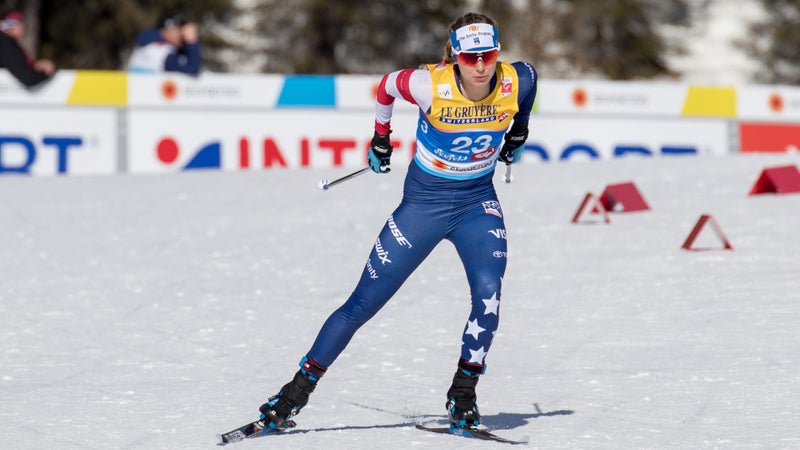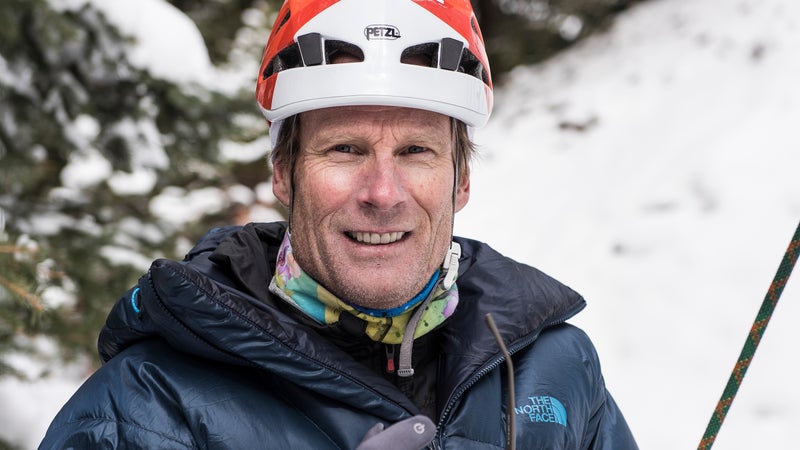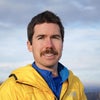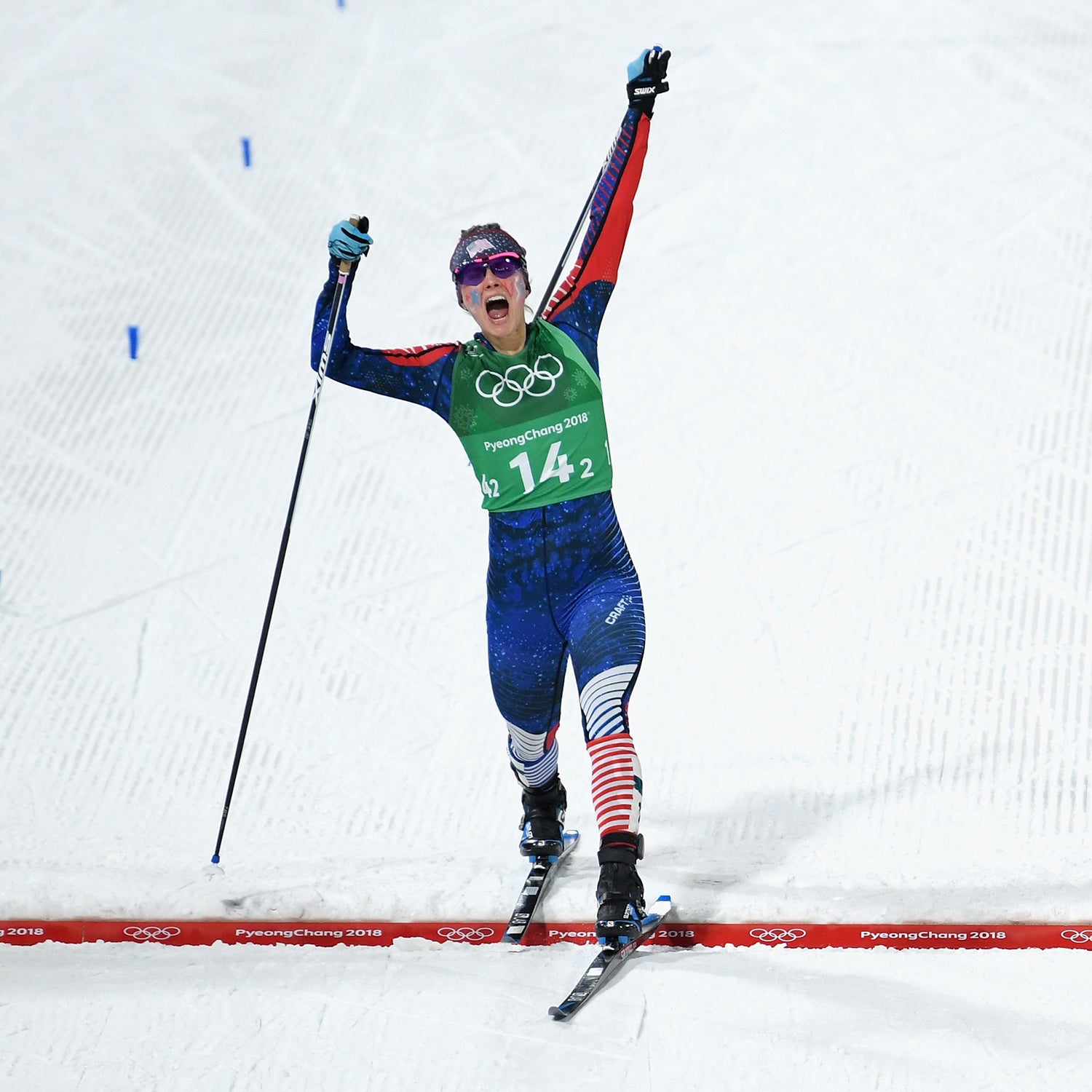Behind every successful mountain athlete is a team of supportive parents, friends, coaches, or╠²partners.╠²We see the end results as a lifetime of first ascents and descents, medals and awards, but rarely do we get a glimpse at their mentors, who helped blaze the trail.
For these╠²eight climbers and skiers, the most powerful and lasting lessons are rarely╠²about technical skills╠²but those less tangible things, like how to learn from failure,╠²find intrinsic motivation, and make decisions in the mountains. What it seems to boil down to isnŌĆÖt a transfer of knowledge so╠²much as validationŌĆöhaving someone in your corner, as professional rock climber Kai Lightner puts it, who unconditionally believes in you.
HereŌĆÖs what these╠²successful outdoor athletes told╠²us about the mentors who shaped their lives.
Angel Collinson, 29, big-mountain skier
Lesson: DonŌĆÖt be afraid to say no.╠²╠²
ŌĆ£W│¾▒▓į first asked me to go film in Alaska, which was the big-dog trip, I was like, ŌĆśAre you guys sure? IŌĆÖve never film-skied before, I donŌĆÖt know what IŌĆÖm doing, youŌĆÖve never met me.ŌĆÖ╠²It was an intense situation as a rookie, but Sage Cattabriga-Alosa and Ian McIntosh, pro big-mountain╠²skiers, met me with such patience. Feeling like youŌĆÖre a part of the team╠²and not a burden is the greatest gift you could ask for when youŌĆÖre entering something new.ŌĆØ
ŌĆ£First and foremost, the biggest lesson they taught me was:╠²never be afraid to say no╠²and step away. When youŌĆÖve been studying a line for weeks, and the film crew is ready, itŌĆÖs hard not to have tunnel vision╠²and miss the signs. But if it doesnŌĆÖt feel rightŌĆöwhether itŌĆÖs in skiing or anything else in lifeŌĆöIŌĆÖm comfortable saying no, because IŌĆÖve seen those guys do it. TheyŌĆÖll be up there, and theyŌĆÖll be like, ŌĆśYou know, I donŌĆÖt like the way this looks.╠²Can I get plucked?ŌĆÖŌĆØ
ŌĆ£ItŌĆÖs really powerful when you see your mentors walking the walk.ŌĆØ
Steve House, 49, alpinist, author, and cofounder of╠²
Lesson: Understand your decisions.
ŌĆ£The most impactful mentor IŌĆÖve had was Ljubo, a guy I met during the year I spent abroad in Slovenia. He was in his late twenties, about ten╠²years older than I was, and the only person I met there who spoke English. I climbed with Ljubo maybe 100╠²days that year.ŌĆØ
ŌĆ£I didnŌĆÖt realize he was a mentor at the time. He was vastly more experienced than I was, but he didnŌĆÖt talk down to me or treat me like a student. I knew I didnŌĆÖt know that much, and that he knew more than I did, but he treated me as a partner╠²and would explain his decision-making, thought processes, and reasoning.ŌĆØ
ŌĆ£Alpinism is a continuous series of life-and-death decisions that begin with planning and end when you step off the mountain. We tend to focus on technical skills, but itŌĆÖs errors in decision-making that typically kill people. The problem is, judgment is virtually impossible to teach, and I think the way you teach it is how Ljubo taught it,╠²by vocalizing his entire thought process. If you canŌĆÖt explain why you came to a certain conclusion, then you donŌĆÖt know enough. YouŌĆÖre just guessing, and you canŌĆÖt be guessing in the mountains.ŌĆØ
, 28, cross-country skier,╠²Olympic gold medalist

Lesson: Be your own judge.
ŌĆ£IŌĆÖve had so many mentors in different areas of life, including my parents, who taught me how to ski, but my high school coach, Kris Hanson, left the greatest╠²impression on me. She cared about my teammates and me╠²as complete people, not just machines to create results.ŌĆØ
ŌĆ£Kris recognized I was very type A╠²and someone who put a lot of pressure on myself. So╠²she would tell me, ŌĆśAfter every race, before you look at the results, I want you to think of three things you did well╠²and three things you could improve on.ŌĆÖ╠²Because no matter how well╠²a race went, youŌĆÖre always going to have room for improvement. And no matter how poorly you think you did, youŌĆÖre still going to have at least three things where you can say to yourself, ŌĆśYou know what?╠²I did this well.ŌĆÖ╠²She taught me how to be the judge of my own performanceŌĆönot the results, not the newspapers, not my name on some piece of paperŌĆöand at the end of the day, I have to be satisfied with the effort I put forth. I think that was key to me being here almost ten╠²years later, just loving what IŌĆÖm doing.ŌĆØ
Kitty Calhoun, 59, alpinist, guide, co-owner of╠²
Lesson: Keep plugging away.
ŌĆ£IŌĆÖm from South Carolina╠²and got into ice climbing when I went to the University of Vermont. An epic on [New HampshireŌĆÖs]╠²Mount Washington got me interested in alpine climbing, but I didnŌĆÖt know any alpinists. I didnŌĆÖt have heroes, because I didnŌĆÖt like reading about climbingŌĆöI just wanted to go climbing. So╠²I went out west.ŌĆØ
ŌĆ£In Wyoming, I met Lyle Dean, and he became my first and biggest mentor. Since we were both interested in winter ascents, we jumped right in and tried a bunch of routes in the Tetons, Cascades, and Palisades. He was a few years younger than me╠²but a more experienced climber, so he took the harder leads, and I observed. I watched how he solved problems, and I think thatŌĆÖs been╠²my biggest takeaway from him. HeŌĆÖs methodical, well prepared, and takes his time to make sure he does things right. HeŌĆÖs also sharp, doesnŌĆÖt give up easily, and has a minimalist approach to climbing.ŌĆØ
ŌĆ£I saw how these traits worked and were effective, and I guess I subconsciously copied him. IŌĆÖm not a gifted athlete, but I had a drive to learn╠²and kept plugging away at it. IŌĆÖve definitely made mistakes, but fortunately, IŌĆÖm still here. The more you can learn from others that have been there, done that, the better off you are. I feel pretty fortunate that he happened to be in the right place at the right time in my life.ŌĆØ
Kai Lightner, 20, rock climber, 12-time national champion
Lesson: Know how to fail.
ŌĆ£W│¾▒▓į I started climbing, it was a super weird sport for my community, especially growing up in a predominately black area in the South. So╠²when I went into╠² for the first time, when I was six years old, my mom begged the man at the front desk to teach me, so I could burn some energy. That man was╠², and heŌĆÖs been my coach ever since.ŌĆØ
ŌĆ£ShaneŌĆÖs not only been an essential part of my climbing╠²but also my life. He taught me how to conduct myself in public settings and in competitions. He taught me how to fail, assess those failures, then turn them into learning experiences. He taught me how to turn hard work into results, knowing itŌĆÖs not about the short-term╠²but the long-term goals. Coaches are life teachers, too.ŌĆØ
ŌĆ£And of course, my mom is superwoman, obviously. She would come from her nine-to-five job to pick me up, bring me to the gym, and belay me for another four hours, then take me home to feed me and help me with my homework. SheŌĆÖs my accountant, my chauffeur, my belayer, my therapist, my everything, honestly. My mother taught me resilience and perseverance╠²and how to put up a strong front, because she is the strongest person I know. I donŌĆÖt know what IŌĆÖd be if I didnŌĆÖt have her in my corner.ŌĆØ
Andres Marin, 36, climber, guide,╠² recipient
Lesson: Be good, be kind, be happy.
ŌĆ£Back in the late nineties, Colombia was going through a crazy political situationŌĆöpretty much a civil warŌĆöand the outdoors wasnŌĆÖt something we had the opportunity to enjoy. People didnŌĆÖt really go to the mountains, because thatŌĆÖs where the war was taking place. When I moved to the United States in 2002, I was able to experience the full power of the outdoors. You can go to the mountains, the rivers, the woods whenever you want╠²and never really worry about something happening to you. So╠²I started climbing as much as I could. In my journeys, IŌĆÖve had the opportunity to run across people who have created a huge impact on who I am now.ŌĆØ
ŌĆ£ and I took a guide course together, and then she offered me a job afterward, helping with╠²climbing comps.╠² was working for her as well, so I had the opportunity to climb with him in Indian Creek [in Utah]╠²and learn from one of the best off-width climbers in the world. When I started moving toward Ouray [in Colorado], where I wanted to live, I had the opportunity to climb with , one of the best ice climbers and soloists in the world.ŌĆØ
ŌĆ£These encounters were totally by chance, and I feel so lucky to have learned from some of the best people on the planet. I also realized theyŌĆÖre humans, just like myself, who focused on something until they became really good. What I have learned through them all is not so much the climbing skills╠²but the more personal side of things, like who we are as humans, our interactions╠²with other people and nature, and how to create a legacy for future generations. I learned a mantra from Conrad Anker: be good, be kind, be happy.ŌĆØ
Conrad Anker, 56, alpinist, father, first to ascend╠²MeruŌĆÖs SharkŌĆÖs Fin

Lesson: Find validation.
ŌĆ£The first time I met [Terrance]╠²ŌĆśMugsŌĆÖ Stump was in the parking lot of the Gate Buttress, a climbing area near Salt Lake City, following my after-the-rainstorm solo circuit. IŌĆÖd try to do all the 5.7ŌĆÖs, 5.9ŌĆÖs looking for bootyŌĆögear other climbers left behind to bail. And Mugs was down in the parking lot. It was like, Whoa, thereŌĆÖs the man. HeŌĆÖs six foot tall, walking on water.╠²He was 14 years older than me╠²and the first person I had as a mentor.ŌĆØ
ŌĆ£We started climbing together that summer, but he said, ŌĆśIŌĆÖm not going to do the big mountains with you until youŌĆÖve climbed Denali and El Cap.ŌĆÖ╠²If youŌĆÖre going to be a mountain climber, those are the two. You learn winter camping on Denali, and on El Cap, you get all the skills needed for technical big walls. He would push me to climb harder╠²and would be like, ŌĆśWell, we both know I can lead this.╠²Can you?ŌĆÖ╠²So╠²I would cinch up my harness and go for it. He handed the sharp end over to me. That someone of his caliber gave me the stamp of approval was pretty key. It validated who I was as a young climber.ŌĆØ
ŌĆ£I was 29 when Mugs died. When youŌĆÖre that age and you lose someone, it places a╠²burden on you.╠²In my journal, there are╠²32 people that have gone before their time. A lot of falling, a lot of moving snow. I see the burden now with the youngsters when theyŌĆÖre going through it. I have a friend, Timothy Tate, whoŌĆÖs 71, and heŌĆÖs a mentor╠²for sure. HeŌĆÖs a philosopher, a thinker, an intellectual, so to say, and heŌĆÖs helping me become who I am in reaching out to young people with loss and grief, which is something weŌĆÖre not collectively talking much about.ŌĆØ
Kit DesLauriers, 49, ski mountaineer, mother, first person to ski the Seven Summits
Lesson: Believe in yourself.
ŌĆ£My mom wanted to be a sports-news broadcaster when she was young, and that was just not acceptable at the time. So╠²when I was growing up, she would say to me, ŌĆśDonŌĆÖt ever let anybody tell you thereŌĆÖs something you canŌĆÖt do, especially because youŌĆÖre a woman.ŌĆÖ╠²That set the bar for me.ŌĆØ
ŌĆ£In 2004, I won the Freeskiing World Championship. The next season, I was riding a chairlift at Jackson [in Wyoming] with somebody I had just met, and he asked me if I was going to compete again. I said, ŌĆśI donŌĆÖt know.╠²What for? You donŌĆÖt make any money, and I already proved to myself that I could do it.ŌĆÖ╠²And he said, ŌĆśYouŌĆÖve got to. IŌĆÖve never seen another woman ski like you. IŌĆÖd like to sponsor you.ŌĆÖ╠²He literally wrote me a check╠²and said to spend it on skiing. I said to him, ŌĆśWhat do you want me to do in exchange?ŌĆÖ╠²And he said, ŌĆśJust pay it forward. For instance, if a girlsŌĆÖ after-school program wants you to come speak to them, I hope you would.ŌĆÖ╠²He taught me how to give back, and his financial support enabled me to continue to pursue skiing. But╠²more importantly, what that really meant was he believed in me.ŌĆØ
ŌĆ£As a kid, I asked my dad, ŌĆśHow come youŌĆÖre not giving me a dollar for every A╠²I get in school?ŌĆÖ╠²And he said, ŌĆśBecause you should want to do well for yourself.ŌĆÖ╠²He was who I called╠²after solo climbing and skiing the Grand [Teton] or winning the world championships. When IŌĆÖd call to tell him the news, he would respond,╠²ŌĆśCourse you did,╠²Kit. YouŌĆÖre the only one who wasnŌĆÖt sure.ŌĆÖŌĆØ
ŌĆ£We often hold ourselves back, but through the kindness and compassion of others, anything is possible.ŌĆØ


